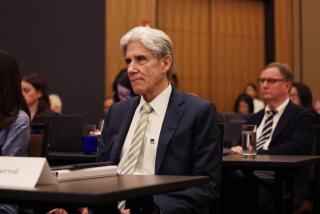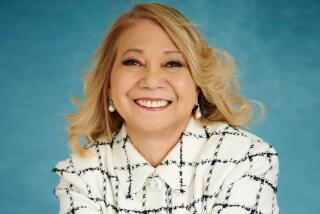A Bird-Watching ‘Free Spirit’ Jealously Guards Personal Time
- Share via
SEATTLE — A four-foot tall papier-mache skeleton lounging on a rocker in Laurel Wilkening’s lake-view living room speaks volumes about what’s in store from UC Irvine’s new chancellor.
Yes, she’s a no-nonsense planetary scientist who penned a report for the National Space Council last year calling for sweeping change in U.S. space programs. Yes, she’s a tough-minded university administrator who pushed for change as the No. 2 officer of the University of Washington for the last five years.
But as the Mexican Day of the Dead doll suggests, the woman who on July 1 will assume the most prominent education job in Orange County also has a wicked sense of humor and eclectic tastes.
She would rather take off in her Jeep Cherokee for a bird-watching expedition than attend society parties. She prefers homemade pancakes made from tiger lilies or squash blossoms, Southwestern cooking drenched in New Mexico chilies, and hole-in-the-wall Chinese restaurants to Seattle’s chi-chi nouvelle cuisine eateries.
“Laurel is a real free spirit,” said longtime friend Ellen Hale, a national correspondent for Gannett News Service in Washington. D.C., who has known Wilkening since her days as a University of Arizona professor and director of its Lunar and Planetary Lab in Tucson. “She’s not the tea-and-crumpets party-circuit type of administrator. No matter what she’s done, she has insisted on keeping a private life.”
Wilkening already has put her UCI staff on notice to leave her calendar clear for at least three evening swims a week. She’ll keep her regimen of regular walks with her husband of 19 years, retired chemist Godfrey Sill, and her excitable Boston terrier, Iggy II.
Laurel L. Wilkening was born Nov. 23, 1944, in Richland, Wash., the oldest of two children.
Her mother, elementary school teacher Ruby Wilkening, had to quit her job in Missouri when she married. It was in the contract.
Her father, Marvin Wilkening, was drafted while a graduate student by Enrico Fermi for the Manhattan Project, the wartime U.S. effort to build a nuclear bomb.
After the war, the young physicist landed a teaching post at the New Mexico Institute of Mining & Technology in Socorro, N.M. It was there that Laurel Wilkening learned to skate, ride bikes and excel at swimming and golf, on and around the nourishing intellectual environment of a small college campus.
“We didn’t push her, we just let Laurel develop naturally,” recalled Ruby Wilkening, 72. “But from her very earliest days, she had a depth to her that was obvious to us. . . . We treated her like a little adult.”
Wilkening graduated from high school with a 4.0 grade-point average and, in 1966, finished Phi Beta Kappa at Reed College, an elite liberal arts campus in Portland, Ore. But her love of learning also encompassed the outdoors.
A bird-watcher from childhood, she and her family favored long hikes and deep-sea fishing off Baja California. She learned to fly the family’s two-seater plane. During weekends and summers, she helped build the family’s log cabin in New Mexico’s Gila National Forest.
It was during a mountain-climbing trip in college that Wilkening got hooked on rocks, on Earth’s geology and on meteorites. By the time she entered the graduate chemistry program at UC San Diego in 1967, she was enthralled by the link between chemistry and space, between history and the frontiers of science.
She still remembers the excitement of “operating with a dental drill” on the first moon rocks returned to Earth. In a lab at the La Jolla campus, eager researchers from dozens of other universities had to watch at a distance as she and a fellow graduate student examined the still-quarantined specimens. “We were the first ones to see cosmic ray tracks in the rocks!” she said, smiling at the memory of chasing and accounting for every chip spun off in the drilling.
Wilkening went on to specialize in asteroids and comets at the University of Arizona and during fellowships at the National Aeronautics and Space Administration. When the proposed U.S. mission to Halley’s comet was killed in 1981, she found herself out on a research limb without a project. About the same time, she was tapped to direct the Arizona campus’ astronomy lab and its badly divided faculty.
She has climbed swiftly up the ranks of academia ever since, all the while continuing to serve on space policy panels for the Reagan and Bush administrations, neither of which seemed to care that she’s a registered Democrat.
As chairman of the National Space Council, she compiled the panel’s recommendations on the direction U.S. space exploration should take. Her report to the White House earlier this year called for better coordination among U.S. civilian, military and commercial space programs, and a shift to smaller, cheaper space missions delivered faster.
“I’d put her on the list to head NASA someday, how about that?” said fellow space council member Pete Aldrich, a former Secretary of the Air Force and now president of Aerospace Corp. in El Segundo. “In fact, I nominated her for the job last year. I don’t think she’ll ever forgive me for that.”
Wilkening, however, plans to focus on UCI and to learn the ropes of the University of California system. To that end, she politely declined a request this spring from the White House to advise President Clinton on space policy.
Profile: Laurel L. Wilkening
Wilkening, a planetary scientist and provost at the University of Washington, becomes chancellor of UC Irvine on July 1. Trained as a chemist, she becomes one of a small number of women to head a major American university.
Born: Nov. 23, 1944, in Richland, Wash.
Education: Graduated Phi Beta Kappa, Reed College, 1966. University of California Regents Fellow 1966-67; Ph.D. in chemistry, UC San Diego, 1970; NASA trainee 1967-70.
Career highlights: University of Arizona, Lunar and Planetary Lab director, 1981-83, vice provost, then provost for graduate research, 1983-88; provost, University of Washington, 1988 to present; vice chairman, National Commission on Space, 1984-86; Advisory Committee on the Future of the Space Program, 1990; chairman of the Space Policy Advisory Board, National Space Council, 1991-93.
Interests or hobbies: Gardening, camping, swimming, collecting ethnic art. Owns a six-acre vineyard 50 miles southeast of Tucson.
Salary: $179,000.
Residence: Will live in university-owned home in Newport Beach until chancellor’s residence is built on campus.
Family/personal: Married to Godfrey T. Sill, former researcher at the University of Arizona. No children. Two dogs.
Sources: Who’s Who in the United States; University of Arizona; University of Washington; UC Irvine
More to Read
Sign up for Essential California
The most important California stories and recommendations in your inbox every morning.
You may occasionally receive promotional content from the Los Angeles Times.










